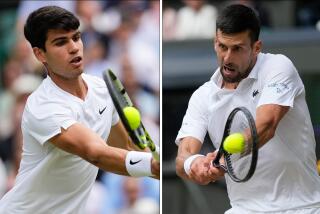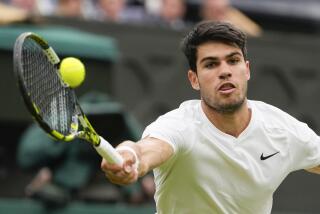Wimbledon Not Ready to Cave on Prize Money
- Share via
Two issues reemerged last week at the world’s most important, most storied tennis tournament, Wimbledon. And before the necessary discussions of seeding committees and gender equity, there is one question that cuts through the noise.
Which, in two groups, would you miss the most at Wimbledon?
A. Venus Williams defending her title. Martina Hingis trying to win without the coaching support of her mother, Melanie Molitor. Anna Kournikova playing on the grass. Kournikova practicing on the grass. Kournikova pouting after missing a shot on the grass.
B. Alex Corretja showing up for only the fourth time since 1992, with his fellow Spaniard and close friend Albert “Call Me Al” Costa, another infrequent visitor to the All England Club.
There, that wasn’t so difficult. Surely the talk among avid tennis buffs and even casual sports fans didn’t focus on the Spanish boycott of Wimbledon last year. Wimbledon got along, even thrived, without the presence of Sergi Bruguera, who’d made three appearances in 11 years.
The tournament, we suspect, could even manage without likable Brazilian Gustavo Kuerten, who threatened to skip Wimbledon in protest of the seedings.
Until it crumbled and announced it had disbanded its seeding committee, Wimbledon was the only event that didn’t strictly follow the ATP’s rankings in seeding players, preferring to maintain some autonomy. Those with grass-court credentials and a degree of British pedigree (Greg Rusedski, for instance) were moved up, and those lacking a grass-court resume (Corretja and Costa) were penalized.
It wasn’t always fair. And the practice backfired in a big way when Rusedski, who was seeded 14th, lost to the free-falling Vince Spadea last year in the first round.
Still, there would have been a little more sympathy for them if some of the offended players had made genuine efforts to adapt to grass. Corretja has won two matches at Wimbledon but has not played any grass-court tuneup events since 1998. Costa has not played a pre-Wimbledon, grass-court tournament on the tour since 1996.
After Kuerten made his statements in Monte Carlo, the reaction from Wimbledon officials was swift. They would try to come up with a more objective way to seed players. Oh, and by the way, the women won’t be getting equal prize money this year. The men’s winner will receive $750,000, the women’s champion $693,000.
If the intent was to bury the news, it worked. The WTA said it received only two phone calls from American journalists last week regarding the issue. Also, there were no women’s tournaments going on because of early-round Fed Cup action. Thus, no provocative quotes after a match from Hingis or Lindsay Davenport or the Williams sisters about the 6.5% prize money increase. The men’s money went up by 4.7%.
Bart McGuire, the chief operating officer for the WTA, addressed the progression.
“Wimbledon continues to be the second-highest paying tournament in the world,” he said in a statement. “For the third consecutive year, Wimbledon has increased its prize money for the women by a higher percentage than for the men. That is encouraging.”
Wimbledon and the French Open are the two Grand Slam tournaments that do not offer equal prize money. This year, network television at the U.S. Open will show the women’s final, not the men’s, in prime time.
“Nevertheless, we continue to be concerned about the slow pace of progress toward equal prize money,” McGuire said. “We believe that the competition and entertainment levels of women’s tennis amply justify equal prize money at all of the Grand Slams. Our on-site attendance and television audience figures clearly show the strength and drawing power of the women’s game. The Australian Open’s move to equal prize money this year--to join the U.S. Open--reinforces the point.”
The leading women seem to be taken for granted at Wimbledon. If Hingis and Venus Williams were to boycott because of the prize money issue, it’s a fair guess they would be hit with a barrage of negative international publicity.
All it took was a two-player boycott from two likable Spaniards and a subtle threat from a charismatic Brazilian to wipe away years of tradition.
ALONE AGAIN, NATURALLY
Hingis will be going her own way on the tour. She already has played two tournaments in April without the coaching assistance and sideline presence of her mother. The mother-daughter relationship was too important to be sacrificed in a coaching dispute, they decided. This sort of clarity unfolds all too infrequently on the tour.
Recently, Taylor Dent and his father Phil showed the same kind of perceptive vision as Hingis and Molitor. Taylor always had been coached by Phil but last winter made the move to former top-10 player Eliot Teltscher.
“I’ve known Taylor and Phil for years,” Teltscher said. “They hit a point where they just felt like they were losing the feeling of being father and son--too much coach and student--and they wanted to be father and son again. They came to me together and said, ‘We’d like you to do this, if you would be willing to do this.’ ”
As with Hingis and Molitor, there was no incident to precipitate the Dents’ decision.
“Everybody thinks there was this big falling-out, but it was exactly the opposite,” Teltscher said. “They wanted to avoid having a big falling out. You wish more of the parents and their kids would realize sometimes they need to be the parent, not the coach.
“We don’t get enough of that.”
LOCALLY
The USTA’s Southern California section will be holding a Cinco de Mayo tennis festival, featuring free clinics, prizes and refreshments, Friday at Belvedere Park tennis courts, 10 a.m. to noon. Details: (310) 208-3838.
More to Read
Go beyond the scoreboard
Get the latest on L.A.'s teams in the daily Sports Report newsletter.
You may occasionally receive promotional content from the Los Angeles Times.











